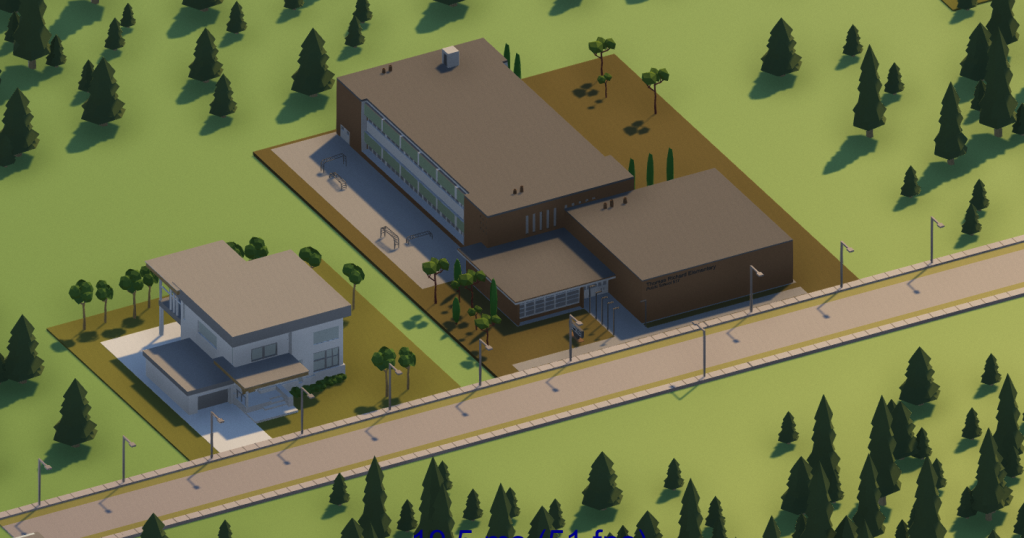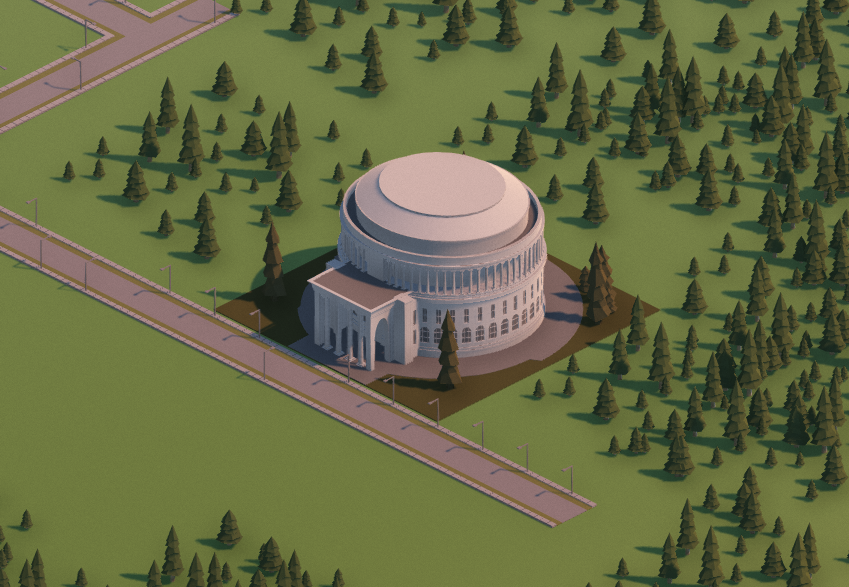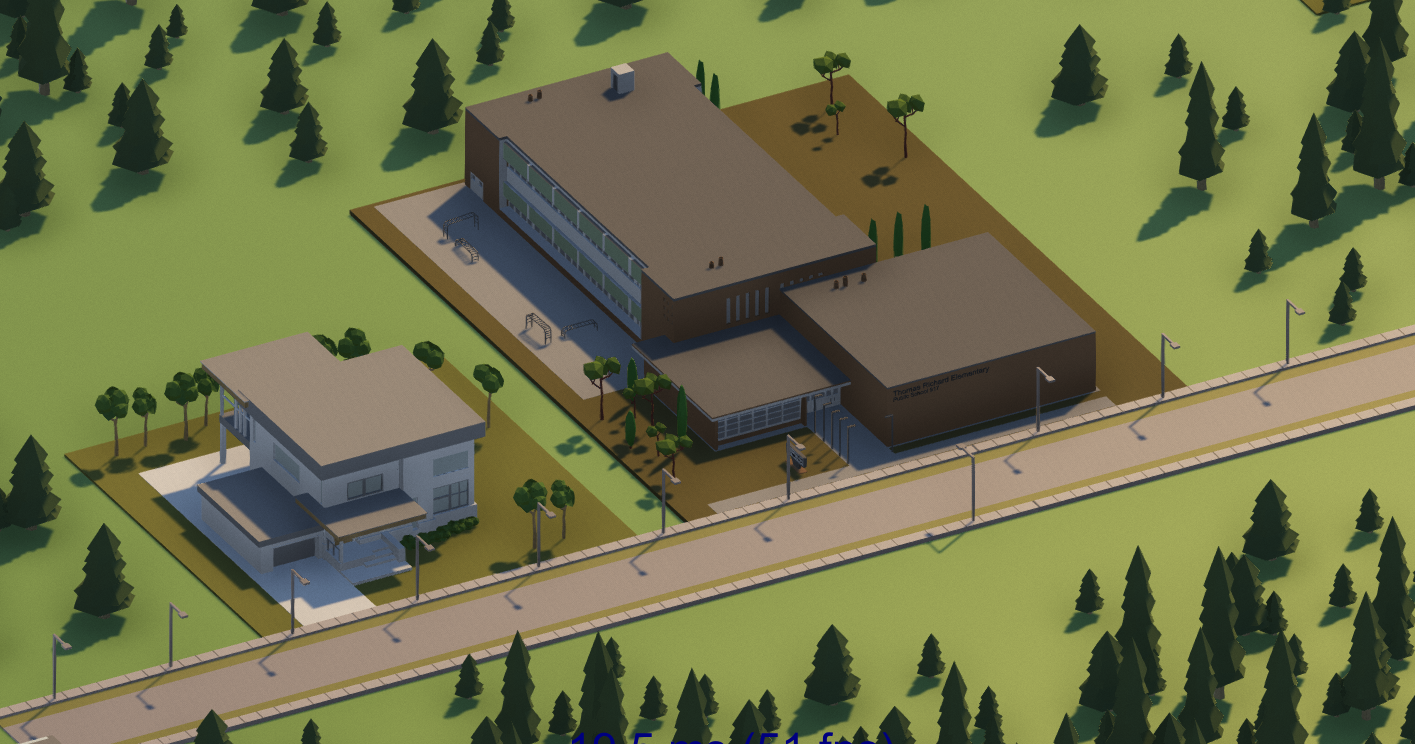
Note: This development diary covers functionality present in the pre-alpha version of the game. All information provided is subject to change as development continues.
Welcome to development diary #5 for Metropolisim – The Deeply Complex City Building and Management game.
Today I want to talk about the education system. Providing access to quality educational opportunities is one of the fundamental aspects of taking care of the citizens of your city. As you will read below, educating the citizens of your city is critical to advancing your city from a small town to a large metropolis. Neglecting education is a certain way to doom your citizens to eternal misery. And maybe that’s your thing?
Education System Overview
Every citizen in the game has an education rating that starts at 0 and goes up to 100. Within this range are education levels like “low”, “medium”, and “high”. I promise I’ll come up with better descriptions.
Education levels directly tie to the type of school that will be required to educate a citizen. For example, citizens with education ratings less than 40 will be required to attend elementary school. Once they reach level 40 they can move on to High School. At level 75 they will be eligible to attend College or a Professional School. One thing to note is that this is not dependent on age. All citizens regardless of age will need to progress through these education ratings.
Higher education ratings are required to take on more skilled jobs such as those in medium to high wealth offices and high-tech industrial zones. Additionally, having an educated population will increase the chance of certain events occurring in-game as well as will increase the likelihood of attracting advanced research organizations and cutting-edge technology opportunities. More to come on this in a future dev-diary. But just know that if you do not educate your citizens you will not be able to progress into a world-class city.
In the early stages of a game, before your city has earned much prestige or renown, most of the citizens who move into your city will have low education ratings. As your city progresses and becomes a large metropolis it will begin to attract new residents looking for high-tech or high-skill/education careers. These citizens will usually move in to your city with higher education ratings.
Education – How it Works
The first step to educating your citizens is to construct buildings, such as schools, in the game world. Students from the surrounding communities will then be able to enroll in the school. Due to schools having a maximum student capacity as well as a maximum range in which students can live in order to enroll in that school you’ll want to think carefully before placing a school. When you choose a site for a school the game will give you some basic information about the area, such as how many students live nearby.
Schools require students to enroll into them and each school has a finite capacity to educate citizens. For example, if you place an elementary school with a capacity of 450 and there are 1,000 students in the surrounding area with an education rating of 40 or less only 450 of those 1,000 eligible students will be able to enroll in that school at any time. As the enrolled students receive education over time they will eventually cap out at a 40 education rating and need to move on to receive the next step in their education at a High School. This will free up capacity at the elementary school for a new student to enroll.
There are two ways to get around this capacity problem. The first, of course, would be to build another elementary school nearby. Of course, this could be cost prohibitive depending on how much room you have in the budget. The second option would be to invest in ‘upgrading’ your first elementary school. There are numerous upgrade paths for every city building. Some of the things you could do to increase school capacity would be to hire additional teachers, increase funding to the school, or build temporary structures to house additional students. Likewise, if there are too few students for the school you’ll want to reduce funding and teacher counts to ensure you aren’t over spending. Just like other systems in the game it will be a constant balancing act.
Schools have an initial cost to build and then an ongoing monthly maintenance cost to keep running. This includes cost for things like teacher and bus driver salaries, supplies, utilities, and other building costs such as building maintenance. One thing to note is that buildings cost more as they age. Older buildings require more maintenance. It makes for an interesting game mechanic when you have to balance the cost of maintaining an aging building vs. the one-time cost to construct a new school. Eventually it will make financial sense to simply demolish a school and construct a new one. But more to come on that in a future dev-diary.
Other Educational Opportunities
Some of the other buildings that provide education include:
Libraries
Museums
More (Surprise)

Both libraries and museums are also cultural attractions which provide land-value boosts to their surrounding tiles. Also interesting to note is that libraries and museums do not require enrollment. That is, every potential citizen that is not max-level education in the surrounding area will potentially get a monthly increase to their education rating based on living near a library or museum.
Charting a Direction
Education is one of the ways you will be able to control the direction and growth of your city. As mentioned above it will be a constant balancing act. One thing to ensure is that you are working towards achieving the optimal balance of education rating distributions among your city’s population.
As your city grows the composition of available jobs will constantly be evolving between low skill (elementary education), medium skill (HS education), and high skill (Post-Secondary education) and you will want to ensure you aren’t over or under educating. For example, if every citizen is education rating 100 and you only have enough high-skill jobs for 20% of those citizens, the other 80% are going to become unhappy due to not being able to find a job that matches their education. This, over time, will lower citizen happiness and your mayor rating and potentially force citizens to abandon their homes and leave for another opportunity in another city. Conversely, if you don’t educate anyone, you will never have enough skilled workers to fill high-skill jobs in high-tech industry and commercial office zones and those businesses will not stay in your city.
One way to manage this is to target the communities where you build schools and provide education. Every area of the city may not need the same education investment. Certainly, higher wealth levels will demand education for their building occupants.
Conclusion
As you can see there is a lot to think about when planning your education and school network within your cities. And this is only the tip of the iceberg. I’ve not covered any of the more advanced elements related to education’s impact on the rest of your city planning or any of the more advanced opportunities you’ll have to dive deep into each school’s individual configuration or the decisions you’ll be able to make at the city level that will impact all schools and students in your city. I will leave this for you to see when the game enters Early Access.
Thanks for reading. Hopefully you enjoyed this update. I’d love to hear your thoughts and questions either in the comments or on the forums.
Roy


Excellent update Roy. Will you be able split up your city into neighborhoods/areas?
Wow, Roy! This is really exciting and the buildings are super detailed. I have to say nobody can do this like you. Keep it up and can’t wait for the next diary update!
Perfect update! Regarding schools. You mentioned expenses for example busdriver. Will every school have their own buslines dedicated to just students?
/ Tobias
What is the next development diary theme?
So hyped for the release! I hope this game will be able to rival Cities: Skylines in terms of scale and complexity, because sometimes you just want something new yet similar to play. Also, what kind of “events” are you talking about?
Have you thought about a mechanism to manage the investment in education? Sounds like your schools can ramp up to meet demand or ramp down when demand is low. Would be nice to have an option that could do that for you if you wish not to manually do it.
Been following the project for a looong time and it gets me more excited each time i see a post finally decided to create an account here to chat! When can we expect the first playable versions of the alpha to be released?
I would love to see something deeper
Just because two people are both high school educated, shouldn’t mean they’re equally skilled.
I’d like to see citizens that can be elementary, highschool, and university level educated, but I would also like to see another stat maybe “Intelligence” or “skill” and that stat would be affected by the quality of the education.
The quality of a school should be based on the budget, but you should also be able to invest in the school directly with new computer labs, music programs, Mathlete tournaments and etc.
Furthermore, the quality of the education provided by the school could degrade over time and the player would need to reinvest to modernize the school.
Actually, I hope all infrastructure degrades over time. That’s a major difficulty for cities today.. The constant upkeep on infrastructure
This game is going to be AMAZING! Keep it up!
I am assuming this may be dead in production? We went from monthly updates, to about two months, and now we are around 4 months. Its a shame, I was looking forward to this – just glad I haven’t pre-ordered yet. I understand you may have a life and be busy, but a small update would be great if this isn’t abandoned. All the best!
Seems like this project is dead in the water. The last update was almost two years ago. I love the concept and I really want to see the finished product. It would also be nice with a tiny update, whether the game is still in development or not. That way I can stop hoping if the project has been abandoned.